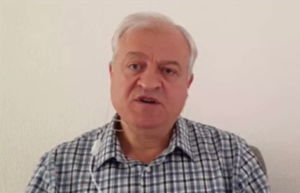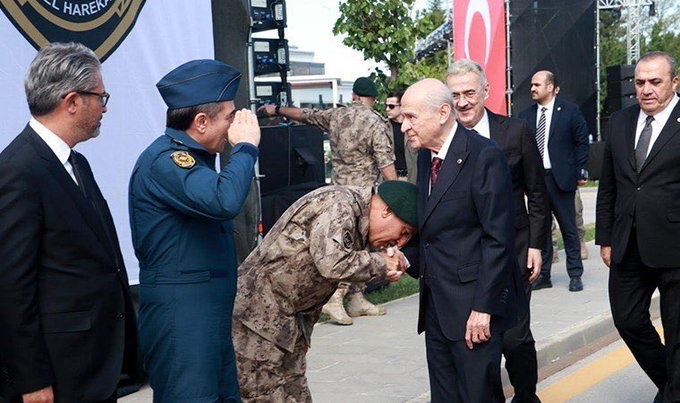Bünyamin Tekin
Footage of a Turkish police chief bowing to kiss the hand of Devlet Bahçeli, leader of the far-right Nationalist Movement Party (MHP), has ignited a wave of criticism and comparisons to historical instances of police forces overtaken by far-right ideologies, such as the Nazi party’s influence over the German police.
The incident occurred on July 15 during Bahçeli’s visit to the Turkish police’s Special Operations Directorate in Gölbaşı, Ankara, to mark the eighth anniversary of the suppression of a coup attempt.
Bahçeli was greeted by Chief of Police Erol Ayyıldız and other officials. Special Operations Chief Süleyman Karadeniz’s kissing Bahçeli’s hand, a gesture typically seen as a sign of deep respect or subservience in Turkish culture, was caught on camera, leading to significant backlash.
Such a brutal picture:the leader of the fascist Grey Wolves is visiting the special unit of the army a its chief is bending down and kissing the hand of the fascist leader, behind him is also the chief of police. The fascist infiltration in the army-police in Turkey is so strong! pic.twitter.com/ZClBvybhBW
— Gül Poyraz (@GuPoyraz) July 15, 2024
Following a wreath-laying ceremony at the Special Operations Monument and a prayer session, Bahçeli greeted the special operations officers before leaving. However, the hand-kissing, done not just by Karadeniz but reportedly by multiple officers, has fueled intense debate.
Critics, particularly from the main opposition Republican People’s Party (CHP), have condemned the gesture. Murat Bakan, the CHP’s shadow interior minister, stated that the act undermines the neutrality and dignity of state officials.
“This police chief must be retired immediately,” Bakan insisted, highlighting that the police uniform represents the state, not a political faction.
Journalist Can Dündar expressed concern about the implications of such displays of loyalty, comparing them to power dynamics seen in totalitarian regimes.
“Bahçeli having the Police Special Operations chief kiss his hand is a display of power. [President Recep Tayyip] Erdoğan, a seasoned politician, surely recognizes the implications,” Dündar said.
Skandal büyüyor, sadece daire başkanı değil:
🔴Özel Hareket Polisleri de Bahçeli'nin elini öpmek için sıraya girmiş!
— Gazete Pencere (@gazetepencere) July 16, 2024
CHP Chairman Özgür Özel also criticized the acts during his party’s weekly meeting. “We do not accept state officials kissing hands and showing deference to political leaders,” Özel said, emphasizing the need for civil servants to maintain impartiality.
The incident has drawn comparisons to the Nazi Germany, where the police forces were deeply influenced by far-right ideology.
The controversy surrounding Karadeniz’s gesture comes amid broader concerns about the politicization of Turkey’s security forces.
Reports indicate that a significant number of provincial police chiefs have nationalist or far-right backgrounds.
The incident has revived longstanding concerns about the growing influence of the MHP within Turkey’s security apparatus, particularly since the party’s alliance with President Recep Tayyip Erdoğan’s ruling Justice and Development Party (AKP). Observers noted the increasing number of senior police and military officers with nationalist affiliations.
Journalist Deniz Zeyrek noted back in 2021 that “approximately 70 out of 81 provincial police chiefs have ultranationalist roots, reflecting a significant shift in the internal dynamics of Turkey’s security apparatus.”
#Turkey 's Erdogan has filled up the positions in the Turkish security apparatus with the so-called 'Grey Wolves' to consolidate his power: A Police Vocational School in Turkey👇 pic.twitter.com/PGZ7cvNKFq
— News About Turkey – NAT (@NewsAboutTurke2) October 16, 2021
The MHP’s growing influence has been evident in several key areas, including the controversial handling of the investigation into the 2022 assassination of Sinan Ateş, a former leader of the ultranationalist Grey Wolves, the MHP’s paramilitary wing. Ateş’s widow has accused authorities of diverting blame to the Gülen movement to protect the real perpetrators.
Analysts likened the scene of Karadeniz kissing Bahçeli’s hand to historical instances of police forces being co-opted by far-right ideologies. The comparison with Nazi Germany’s police forces under Heinrich Himmler and Reinhard Heydrich has been particularly scathing, highlighting fears of a similar trajectory of state institutions being subverted by political ideologies.
Prominent journalist Can Dündar echoed these sentiments. “Our next documentary is about the ‘deep state.’ Explaining the concept to a German audience was challenging, but this photo made it easier. The idea of a partisan police force is something Germans are well acquainted with from their history. The documentary will air in August,” he said.
In response to the backlash, government officials have remained largely silent, while MHP supporters have defended Karadeniz, claiming the gesture was a traditional sign of respect.
However, there is more to this scene than what critics and supporters alike see, according to İsmail Öztürk, a former high-ranking police officer who was previously deputy chief of the Ankara Police Department and has more than two decades of experience fighting organized crime.
“A high-ranking police chief demonstrating such a servile gesture to a party leader cannot be random or without the backing and consent of his superiors, who were present there,” Öztürk told Turkish Minute. “This looks like a carefully thought-out display, which should be considered together with the display of the Grey Wolves sign by a player of the Turkish national football team at the European Championship.”
An alleged ultranationalist gesture by Turkish defender Merih Demiral as he celebrated scoring in the win against Austria at Euro 2024 has prompted calls on the German government to ban Turkish ultranationalist group the Grey Wolves, to which the gesture is linked. The 26-year-old defender mimicked the shape of a wolf’s head with his fingers after his second goal in Turkey’s 2-1 win over Austria in the last-16 of Euro 2024. Demiral’s gesture prompted UEFA to suspend him for “inappropriate behavior” and sparked condemnation from German leaders, but Ankara immediately branded Berlin’s reaction as “xenophobia.”
According to Öztürk, these are ultimately thought-out moves to prop up the image of the MHP, whose reputation had been tarnished by allegations of involvement in the murder of Ateş as well as bribery and other facets of organized crime. “If this move by the police chief was not consented to by Erdoğan, he would have immediately dismissed them for displaying such loyalty; it would be considered mutinous,” Öztürk said.
How influential are the Grey Wolves in the Turkish police?
According to former police chief Öztürk, the presence of MHP loyalists in the police department is a multilayered matter. “Historically, the Grey Wolves have not focused on recruiting the highly educated. They typically recruited university students from sports-related faculties, where academic grades are less important than excelling in sports,” Öztürk explains.
“This is why those who really come from a Grey Wolves background are the minority of MHP loyalists in the police force; one can say 10 percent as a ballpark figure,” Öztürk said. “And there is another 10 percent who actually come from religious or sectarian minorities in Turkey and have no way of surviving in religious groups that have influence in the state apparatus but are also unable to survive on their own.”

According to Öztürk, these people embrace the nationalist ideology of the Grey Wolves to shield themselves from religious zeal and preserve their way of life by replacing their lack of religious observance with ultranationalist fervor. “These are not the rank and file members of the MHP; they can climb the ladder to higher positions because they are more motivated by being in the minority,” he said.
“Another 20 percent are the corrupt officers, those who relish the lack of enforcement of laws and fill their pockets by whatever means necessary,” Öztürk explains. “These are utilizing the protective armor afforded them by the MHP identity for personal gain.”
According to Öztürk, a majority of those who identify themselves as MHP loyalists, either in the police forces or other institutions of the state, are the ones who want to avoid any harm from the opposing winds by finding refuge under the banner of the MHP, without any actual malicious intent.
“These are poor Anatolian people who are afraid of the state’s wrath and want to preserve what little they have, so they embrace this identity which they see as approved and fostered by the state apparatus,” Öztürk said.
